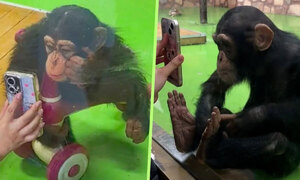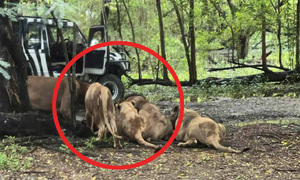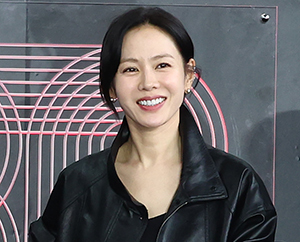Singularity is the point at which artificial intelligence will meet and then exceed human capacity. The most optimistic estimates of scientists who think about the problem is that approximately 40 percent of jobs done by humans today will be lost to robots when the singularity point is reached and exceeded; others think the displacement will be much higher.
Some believe that we will reach singularity by 2024; others believe it will happen by mid-century, but most informed observers believe it will happen. The question Mr. Musk is posing to society is this; just because we can do something, should we?
In popular literature and films, the nightmare scenario is Terminator-like robots overrunning human civilization. Mr. Musk’s fear is the displacement of the human workforce. Both are possible, and there are scientists and economists seriously working on the implications of both eventualities. The most worrying economic scenario is how to reimburse the billions of displaced human workers.
We are no longer just talking about coal miners and steel workers. I recently talked to a food service executive who believed that fast food places like McDonald’s and Burger King will be totally automated by the middle of the next decade. Self-driving vehicles will likely displace Teamsters and taxi drivers in the same time frame.
우리는 인공지능의 성능을 어디까지 원하는가
개리 앤더슨(칼럼니스트)
선견지명이 있는 기업가 일론 머스크는 인공지능의 발달이 지구 온난화 혹은 열핵 전쟁을 훨씬 능가하는 인류문명의 최대 생존의 위협이 될 가능성이 있는 것으로 느끼며 이와 관련하여 경고사격을 했다. 그 점에서는, 특이점 및 인공지능의 자기 인식을 추구하는 것이 위험하다고 생각하는 스티븐 호킹과 다른 과학자들이 그와 뜻을 같이한다.
특이점은 인공지능이 인간의 능력에 도달하여 추월하는 지점이다. 이 문제를 고려하는 과학자들의 가장 낙관적인 추산에 따르면, 특이점 도달 및 추월이 실현될 때 오늘날 인간이 수행하는 업무의 대략 40%가 로봇으로 이동한다. 다른 사람들은 이동비율이 훨씬 높을 것으로 본다.
일부 사람들은 우리가 2024년이면 특이점에 도달할 것으로 생각한다. 세기 중반에 실현될 것으로 믿는 사람들도 있지만 특이점 실현의 가능성에는 대다수 정통한 관측자들이 동의한다. 머스크가 사회에 제기하는 질문은 이것이다. 우리가 어떤 것을 할 수 있다는 단순한 이유 때문에 그것을 해야 하는가.
대중문학과 영화의 악몽 같은 시나리오는 인류문명 속에 급속히 퍼지는 터미네이터 같은 로봇들이다. 머스크가 두려워하는 것은 인간 노동력의 이동이다. 이 두 가지 모두 실현 가능하며 그 결과를 진지하게 연구하는 과학자들과 경제학자들이 있다. 가장 걱정되는 경제 시나리오는 쫓겨난 수십억 명의 인간 노동자들에 대한 배상 방법이다.
단지 석탄과 철강 노동자들을 언급하는 것이 더 이상 아니다. 필자는 최근 외식산업의 한 중역과 대화했는데 그는 맥도널드와 버거킹 같은 패스트푸드 업소들이 다음 10년대의 중반까지 완전 자동화될 것으로 생각했다. 자율주행 차량들이 그와 동시간대에 트럭과 택시 기사들을 대체할 가능성이 있다.
역주=오성환 외신전문위원 suhwo@segye.com
△visionary:선견지명이 있는 △in that:이라는 점에서
△singularity:특이점, 특이성, 인공지능이 인간지능을 능가하는 기점
개리 앤더슨(칼럼니스트)
선견지명이 있는 기업가 일론 머스크는 인공지능의 발달이 지구 온난화 혹은 열핵 전쟁을 훨씬 능가하는 인류문명의 최대 생존의 위협이 될 가능성이 있는 것으로 느끼며 이와 관련하여 경고사격을 했다. 그 점에서는, 특이점 및 인공지능의 자기 인식을 추구하는 것이 위험하다고 생각하는 스티븐 호킹과 다른 과학자들이 그와 뜻을 같이한다.
특이점은 인공지능이 인간의 능력에 도달하여 추월하는 지점이다. 이 문제를 고려하는 과학자들의 가장 낙관적인 추산에 따르면, 특이점 도달 및 추월이 실현될 때 오늘날 인간이 수행하는 업무의 대략 40%가 로봇으로 이동한다. 다른 사람들은 이동비율이 훨씬 높을 것으로 본다.
일부 사람들은 우리가 2024년이면 특이점에 도달할 것으로 생각한다. 세기 중반에 실현될 것으로 믿는 사람들도 있지만 특이점 실현의 가능성에는 대다수 정통한 관측자들이 동의한다. 머스크가 사회에 제기하는 질문은 이것이다. 우리가 어떤 것을 할 수 있다는 단순한 이유 때문에 그것을 해야 하는가.
대중문학과 영화의 악몽 같은 시나리오는 인류문명 속에 급속히 퍼지는 터미네이터 같은 로봇들이다. 머스크가 두려워하는 것은 인간 노동력의 이동이다. 이 두 가지 모두 실현 가능하며 그 결과를 진지하게 연구하는 과학자들과 경제학자들이 있다. 가장 걱정되는 경제 시나리오는 쫓겨난 수십억 명의 인간 노동자들에 대한 배상 방법이다.
단지 석탄과 철강 노동자들을 언급하는 것이 더 이상 아니다. 필자는 최근 외식산업의 한 중역과 대화했는데 그는 맥도널드와 버거킹 같은 패스트푸드 업소들이 다음 10년대의 중반까지 완전 자동화될 것으로 생각했다. 자율주행 차량들이 그와 동시간대에 트럭과 택시 기사들을 대체할 가능성이 있다.
역주=오성환 외신전문위원 suhwo@segye.com
△visionary:선견지명이 있는 △in that:이라는 점에서
△singularity:특이점, 특이성, 인공지능이 인간지능을 능가하는 기점
Copyright ⓒ 세계일보. 무단 전재 및 재배포 금지
![[설왕설래] 러닝 크루(running crew)](http://img.segye.com/content/image/2025/09/18/128/20250918519213.jpg
)
![[기자가만난세상] 케이블카보다 지켜야 할 ‘전주의 가치’](http://img.segye.com/content/image/2023/10/10/128/20231010500064.jpg
)
![[오늘의 시선] 그게 남의 일이라고?](http://img.segye.com/content/image/2025/09/18/128/20250918519131.jpg
)
![[박일호의미술여행] 추상미술의 매력](http://img.segye.com/content/image/2025/09/18/128/20250918519162.jpg
)






![[포토] 고윤정 '반가운 손인사'](http://img.segye.com/content/image/2025/09/18/300/20250918519178.jpg
)

